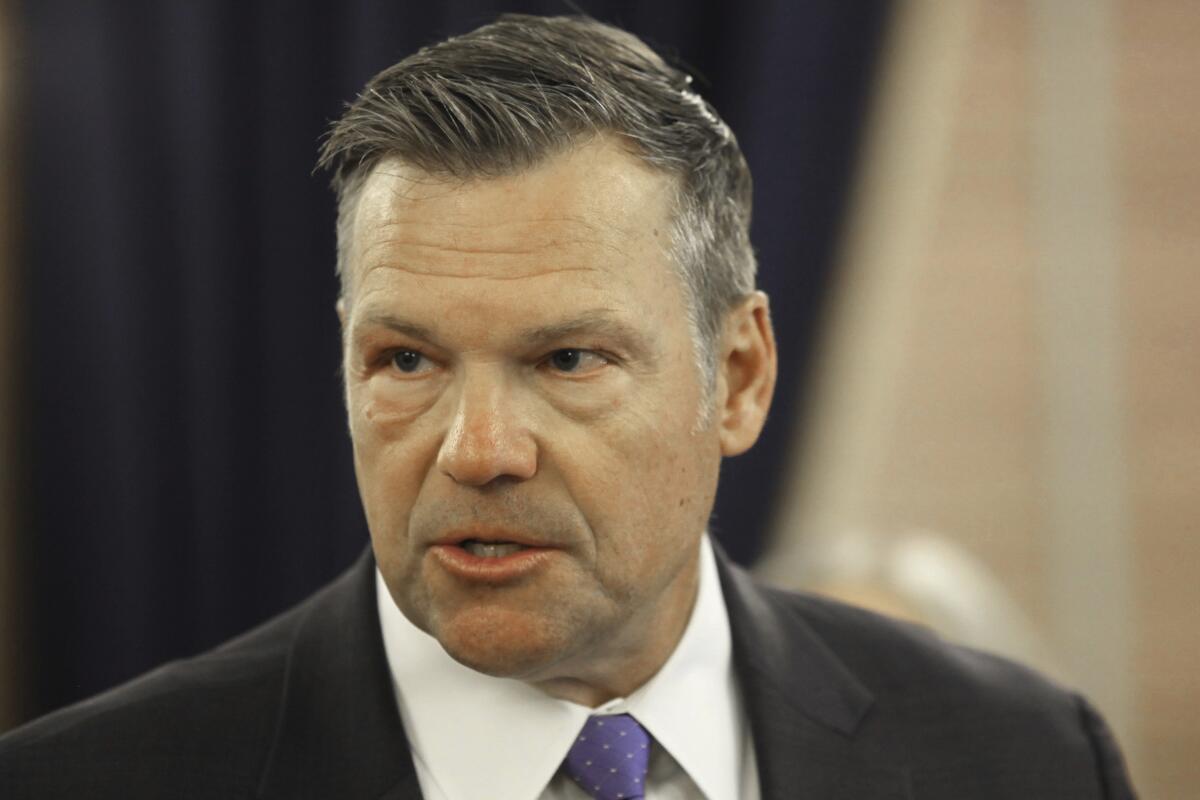Republicans would rather keep poisoning children with lead than pay for a fix

- Share via
Here are a few things we know about lead in drinking water:
◆ There is no known safe level. More than a decade ago, the Centers for Disease Control and Prevention ceased setting minimum acceptable standards for children’s blood lead levels.
That was because scientific studies couldn’t identify any concentration that didn’t have “deleterious effects” on children’s health. The only proper approach, the CDC said, is prevention “to ensure that no children in the U.S.” face any exposure to lead.
Lead exposure causes damage to the brain and kidneys and may interfere with the production of red blood cells that carry oxygen to all parts of the body.
— Environmental Protection Agency
◆ Removing all the sources of lead exposure is expensive, but over the long term a sound investment, for it eliminates long-term effects that lead to massive healthcare costs, cognitive deficits and higher crime rates.
◆ Children in low-income and minority neighborhoods are the most seriously affected, because their families have few options to avoid exposure. The lead crisis in Flint, Mich., erupted as a national scandal in 2011, but it was the tip of the iceberg.
Get the latest from Michael Hiltzik
Commentary on economics and more from a Pulitzer Prize winner.
You may occasionally receive promotional content from the Los Angeles Times.
◆ Industry has been opposing abatement programs for decades — in California, for instance, three companies that produced and promoted lead paint for homes fought a 19-year legal battle to evade the costs of residential abatement. They finally reached a $305-million settlement with several counties and cities in 2019.
That brings us to the latest initiative by the Republican attorneys general of 15 red states, aimed at stifling a lead abatement initiative of the Biden administration.
Led by Kansas Atty. Gen. Kris W. Kobach, they’ve taken aim at a proposal by the Environmental Protection Agency to order the removal of some 9 million lead water lines across the country. The rule conforms with an action plan Biden issued in 2021 aimed at replacing 100% of the lead water lines serving homes in the U.S.
Trump and Robert F. Kennedy issued attacks on child vaccinations, including for polio, last week. They want to return us to the 1950s, when preventable diseases struck millions of Americans.
You may remember Kobach’s name from his adventures waging various right-wing culture battles, all of which he lost — often at the expense of the localities that followed his lead as Kansas secretary of state. These included failed efforts to enact draconian anti-immigration ordinances.
In 2018, Kobach suffered a mortifying defeat at the hands of a federal judge who overturned a Kansas law he championed that required proof of citizenship to vote. The judge further held him in contempt for repeatedly flouting courtroom procedure.
Kobach lost races for governor in 2018 and the U.S. Senate in 2020, but managed to win a race for attorney general in 2022. From that perch he has been pressing his new cause — exposing Kansans to lead in their drinking water.
In a comment letter to the EPA, Kobach and his colleagues call the proposed rule “unworkable, underfunded, and unnecessary.” They also say the benefits “may be ... entirely speculative.”
They suggest it’s an infringement of states’ rights, which is an argument that has seldom been heard since the Civil War.
The Kobach cabal, which encompasses the attorneys general of Arkansas, Florida, Georgia, Idaho, Louisiana, Iowa, Mississippi, Montana, Nebraska, South Carolina, South Dakota, Texas, Utah and Wyoming, further asserts that private homeowners would “bear the brunt of the costs.”
With one exception, all these claims are false. The one true assertion is that the mandate is underfunded. Estimates of the cost of meeting the EPA’s proposal run from about $45 billion to $60 billion.
Biden’s 2021 infrastructure bill allocated $15 billion for the purpose — but he originally proposed $45 billion, which was pared down in congressional negotiations.
As for the rest, obviously the rule isn’t “unworkable.” The EPA proposes to give localities and utilities 10 years to complete the mandated replacements, averaging 10% of the work per year. The red states say that’s an unreasonably “tight timeline.” But the rule makes municipalities with especially numerous lead pipes, such as Chicago, Cleveland, New York and Detroit, eligible for extensions.
Florida Surgeon Gen. Dr. Joseph A. Ladapo is advising people to avoid the most effective COVID vaccines, just as a surge in disease cases gets worse.
The technology and engineering necessary for the job are well understood. Newark, N.J., replaced its more than 23,000 lead water lines via a three-year, $170-million program that commenced in 2019, all at no direct cost to homeowners — despite what Kobach et al. claimed. Green Bay, Wis., completed the replacement of its 2,000 lead lines in 2020, after a five-year effort that also required no out-of-pocket spending by homeowners.
Is it “unnecessary”? Are the benefits “speculative”? Surely not.
The adverse health impacts of lead in drinking water are absolutely indisputable. The EPA’s proposed rule spelled them out, with citations to the relevant scientific data.
“Lead exposure causes damage to the brain and kidneys and may interfere with the production of red blood cells that carry oxygen to all parts of the body,” the proposal stated. “The most susceptible life-stages are the developing fetus, infants, and young children.... Because they are growing, children’s bodies absorb more lead than adults do, and their brains and nervous systems are more sensitive to its damaging effects. As a result, even low-level lead exposure is of particular concern to children.”
As for the special vulnerability of children in low-income communities to these conditions, a 2021 study in JAMA Pediatrics found that children in those communities are nearly 2.5 times as likely to have elevated blood lead levels compared with those in low-poverty areas.
Another 2021 study found that Black infants suffered a 50% higher average loss of IQ points attributable to blood lead than white or Hispanic infants, costing them an estimated loss in lifetime earnings of more than $47,000.
These considerations should make the eradication of lead from drinking water a major goal for a party that claims to be devoted to the health and welfare of children, even before infancy. But actions speak louder than words, and the actions of Republicans tell us that they care a lot more about money than about children.
Let’s start with the lead water pipe rule that the new EPA proposal aims to replace. The old rule was promulgated by the EPA under Trump. It was issued on Jan. 15, 2021, five days before Trump left office.
Iowa and Nebraska reject U.S. money for a summer children’s food program even though the federal government is picking up the tab.
The Trump rule left in place a preexisting standard of 15 parts per billion of lead in water that had been the trigger for lead pipe removal. That was three times the level deemed the maximum allowable in Canada and the European Union, the Natural Resources Defense Council reported.
The Trump rule also extended the deadline for pulling out lines in the most heavily contaminated systems to 33 years, from 14. The NRDC estimated that the weakened standards would leave more than 5.5 million people exposed to heavily contaminated drinking water for decades to come.
The Biden administration suspended the Trump proposal upon taking office. That won support from the attorneys general of eight states, including California and the District of Columbia, who rightly labeled exposure to lead “a public health issue of paramount importance.”
The proposal being challenged by the Republican attorneys general is its replacement. It accepts no compromise in pulling the most dangerous sources of lead poisoning out of the ground.
No one disputes that eliminating lead from drinking water is an expensive undertaking. But if Kobach and his colleagues are really concerned that the EPA rule is an “unfunded mandate,” as they label it in their comment letter, there’s an obvious solution: They should turn their political influence to persuading their congressional delegations to funding it.
Those 15 states have 30 senators among them (all but three Republicans) and 118 House members (83 of whom are Republicans). That would be a good start at getting billions more appropriated to cover removal of every lead pipe in the country. If they truly care about the children, what are they waiting for?
More to Read
Inside the business of entertainment
The Wide Shot brings you news, analysis and insights on everything from streaming wars to production — and what it all means for the future.
You may occasionally receive promotional content from the Los Angeles Times.














